Last Updated on June 29, 2022 by Rebecca Huff
What can you do to celebrate America Recycles Day? You can get involved!
Keep America Beautiful
Recycling isn't a new concept, yet only 34% of all waste is recycled. “It can be difficult for consumers to understand what materials can be recycled, how materials can be recycled, and where to recycle different materials. This confusion often leads to placing recyclables in the trash or throwing trash in the recycling bin or cart.”
Education is crucial as this problem impacts many people across the globe, and it's one that we will pass down to our children.
Before we think about recycling, it's vital to think about refusing what we don't truly need and reusing what we already have.
Start by recycling correctly. When we recycle right it:
- creates jobs
- reduces the depletion of resources
- conserves energy
- reduces deforestation
- conserves fresh water
- keeps waste out of the ocean
The best way to make sure you are recycling correctly in the area where you live is to spend a few minutes on your local city government website. Type in a search for your city and “recycling” to find that information quickly and easily.
You can also participate in programs like the Keep America Beautiful Great American Clean Up on America Recycles Day. Join KAB here.
It's interesting to note where the items you recycle end up. Ask questions.
Unless you follow your recyclables through the entire process until they're made into new products, it's impossible to say for certain whether your materials are actually being recycled. But, logically, the reason you can feel assured that most of your recyclables actually get recycled is because they have a dollar value.
Recyclables are considered a commodity — a good that can be sold. Those cans, bottles and boxes you recycle can be broken down into raw materials again and sold to manufacturers. And since consumers like products made from recycled materials, manufacturers buy more recycled materials for their products. This means the prices for these commodities increase, which means recycling programs remain feasible.
Recycling in Knoxville, Tennessee (where I live), is different. “Unlike other American cities where they have been selling to China, we have local markets here,” [Patience] Melnik noted. “We have a lot of industries that need those materials here in the Southeast.”
So, “With every visit to one of Knoxville or Knox County's recycling centers, or with every fill-up of your recycling bin, you are contributing to the local economy and making Knoxville a greener place.”
Switch to reusable bags for the love of Pete!
We could drastically cut down on plastic film problems if we all considered reusable grocery bags! One of the biggest mistakes we see at our local recycling centers is filmy grocery bags in the bin for plastics. As I mentioned before, education is key. If you take a look at the city or county websites you'll find:
NO plastic bags- all recyclables should be loose in the bins- not bagged. Please consider taking empty plastic bags back to a local grocery or hardware store for recycling. We highly recommend using reusable bags.
Most recycling centers do not want plastic bags (from stores) in with the plastics because they can clog the machines. Milk jugs, water bottles, and other plastics should be put into the recycling bins loose. Many retailers provide front-of-store recycling to their customers. More than 18,000 locations across the United States and Canada collect post-consumer plastic film at the front of their stores. Find a drop off for plastic film near you.
Unless you are unable, drink without a straw
“91% of all discarded plastic never actually gets recycled. For straws, it's often due to their size. As a result, a majority of all plastic will end up in landfills or, more likely, the ocean.”
You don't need to buy a straw replacement, although there are plenty of options out there if you are unable to drink from a cup!
So many people tell me that they don't want to put their mouth where other people's mouths have been and hence the use of the liquid extraction device. Or they don't want to get their lipstick on the glass. But why must we suck so much when experts predict by 2050, plastic will literally outweigh all the fish in the sea?
If your child has ever seen the video of the sea turtle with a bloody nostril due to a straw being stuck in it, you wouldn't give two cents about a lipstick stain. Besides, unless you are using a lipstick that doesn't contain carcinogens, the germs left behind on that cup are the least of your risks.
As for the other plastics such as milk jugs
Check the number on the bottom of plastic – if it is unmarked, most likely it is not recyclable – Know which numbers your local recycling centers take. Most recycling centers take #1, #2 – #4, and #7 are typically not recyclable, and if they are compostable, it will say on the packaging.
Were you wondering What those numbered recycle symbols on plastic mean anyway?
Plastic degrades in quality when it is recycled, and while it's tough to know how many times a piece of plastic will get recycled before becoming unusable, experts estimate it may only be once or twice. After that, it is landfilled, incinerated, or ends up in the environment. There's only one real solution, these experts say: make and consume less plastic.
Know how to recycle: Rinse your recyclables – rinse glass, plastic, tin cans, etc. before you take them to the recycling bin.
Confusing labels and unmarked bins
Part of the problem could be confusion as to how to recycle. Standardized recycling labels seek to eliminate confusion at the bins.
During a sustainability conference in which [Michelle] Hedlund was asked to speak, she decided to test out her confusion theory on the audience. She showed an image of five different stop signs, but none of them looked like the stop sign that we are used to in the states.
What would happen in society if we had to come up with our own stop sign? I then flipped the screen, and it filled up with all the various recycling bins, and none of them had the same looking label. And that is what recycling looks like to us today,” she said.
After doing more research, Hedlund concluded that the inefficiency of recycling comes down to our experience at the bin.
The general public likes the idea [of recycling] in theory, but it's so confusing they aren't able to do it properly,” she said. “The manufacturers have a tremendous amount of pressure to use recycled content, but the commodity is not something that they can rely on and they don't know if there's enough to make the switch. But how can you fix a broken system? By incorporating standardized recycling labels, which is how the nonprofit Recycle Across America (RAA) was born.
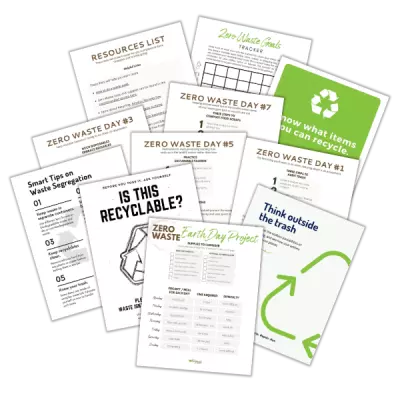
We need YOU to help impact climate change
Join the waitlist for upcoming Zero Waste Courses to assist you on your journey to reducing waste.
What about simply eliminating single-use plastics when other alternatives are available?
The EU will ban single-use plastics starting in 2021. “Along with plastic plates, cutlery, and straws, the ban would also include plastic cotton buds, drink stirrers, and food containers, all of which make of 70% of pollution in the EU's waterways and coastlines.”
Taiwan, once referred to as “Garbage Island,” now boasts an impressive 55% recycling rate. So how did this small island country once known for its waste problem become a global leader in recycling?
One of the many solutions in Taiwan is a public place to drop off food waste. Something we don't see much of here in the states. Although it's a good idea to do a quick search to see if the city you live in has composting services. For example City Compost in Massachusettes.
Composting is another way of recycling or reusing!
Not surprisingly the city that composts the most is in California.
Hundreds of thousands of San Franciscans, as well as local restaurants and food-related establishments, contribute more than 300 tons of organic garbage each day — that's more than 100,000 tons per year. This waste travels to nearby modern composting facilities for treatment [source: SFEnvironment]. Once that waste is turned into compost, agricultural operations such as local vineyards will pay big bucks for the nutrient-dense material.
Where city composting isn't available there's always backyard composting. When that isn't an option, there's always this genius solution for inevitable food waste such as eggshells and banana peels. See the before and after photos below. One bucket of food waste going in:

About a cup of nutrient-rich fertilizer for my plants coming out of my Foodcycler:
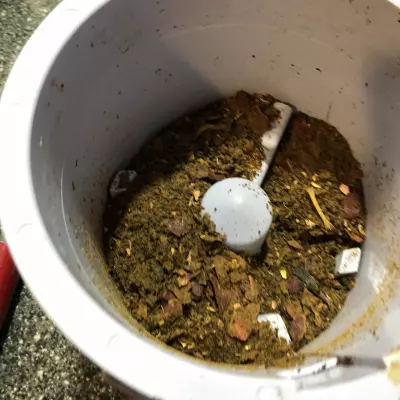
Other tips on recycling for America Recycles Day:
- Separate your recycling unless your local center does it for you (some cities collect all recycling and then have employees and machines that do the separating.)
- Newspapers should be recycled always
- Corrugated Cardboard is a valuable recyclable but not greasy pizza boxes – keep it dry and clean – and break it down! “Stuffing the bin full of still 3D boxes means there's less room for other recyclables, which then end up getting put into the trash instead.”
- Paper can be left on glass jars, but they must be rinsed. So, rinse your recyclables – rinse glass, plastic, tin cans, etc. before you take them to the recycling bin. And make a note about how to deal with glass, many centers will separate clear, green and brown glass for recycling.
- Buy recycled items. This creates a demand for recycled products and helps use up what we recycle. This also reduces the amount of virgin materials needed to create new products.
- Share your passion on social media. Talk about the importance of recycling to preserve natural resources.
- Contact event organizers (or be one yourself) and see what you can do to get involved.
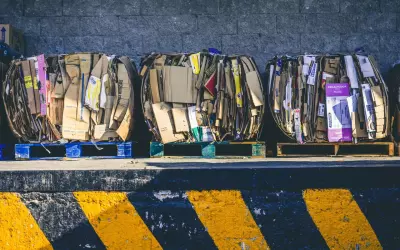
Don't forget to recycle beverage cans!
Americans, on average, drink one beverage from an aluminum can each time, but we only recycle just over 49% of the cans we use. 2.7 million tons of aluminum is discarded each year, and of that, only 50% is recycled.
Other Things you may not realize you can recycle:
When considering waste management, do a search to see if an item can be recycled before tossing it!
Take contact lens bubbles & lenses for example: Recycling something as small as a contact lens can make a big difference as it can help reduce microplastics. Contact lenses contribute to the trillions of microplastics in our water that can harm fish and enter the food supply.
Standard recycling doesn't work for contacts. Because of their small size, contact lenses can get filtered out and end up in landfills. My eye doctor has a recycling box – you can see her at Walmart and Sams Club and take all of your contact bubbles and contacts in for her to recycle for you.
Another small item with a large impact is shampoo or conditioner bottle lids. Aveda offers a fabulous solution with its “Recycle Caps” program. The formerly ostracized polypropylene plastic is melted down and a new product container or cap is made with it. Alternatively, skip the packaging and use shampoo bars (and conditioner bars too!)
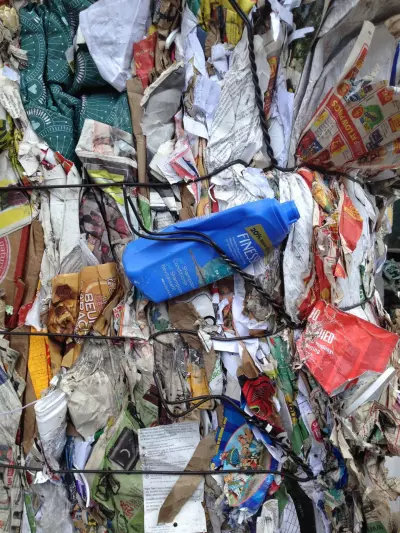
Once you determine to recycle or properly dispose of all the items you once tossed “away” you will find there are many programs out there to recycle the most obscure items.
These programs are free, national recycling solutions for typically hard-to-recycle waste streams. Join as many programs as you like to help reduce your impact on our planet.
Again, look at reality when we are shopping, opt for foods in their natural packaging! Skip plastic wrapped in plastic. Take the extra 5 minutes to chop your own veggies if it means you can buy them without plastic. Take your own reusable produce bags when you go shopping instead of using the nightmarish plastic film bags available in the store. Choose cleaning products that aren't made of plastic!
While all of this may sound like a lot of work, consider this:
Nguyễn Thị Hồng Thắm, a 60-year-old Vietnamese mother of seven, living amid piles of grimy American plastic on the outskirts of Hanoi is paid the equivalent of $6.50 a day to strip off the non-recyclable elements and sort what remains: translucent plastic in one pile, opaque in another.
Again, remember to use less and reuse more, then recycle what you can. Let's make America a nation of recyclers!
Happy America Recycles Day!

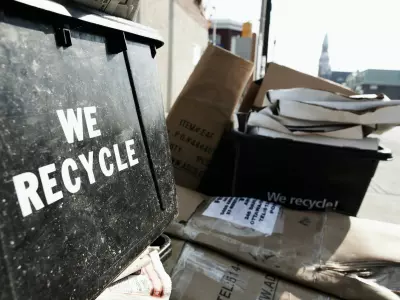
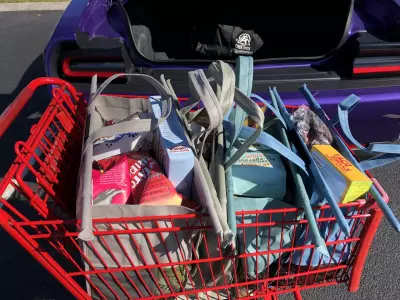
 Low Carb Pumpkin Swirl Cheesecake – Sugar-free, Keto & THM friendly
Low Carb Pumpkin Swirl Cheesecake – Sugar-free, Keto & THM friendly
Leave a Reply
You must be logged in to post a comment.